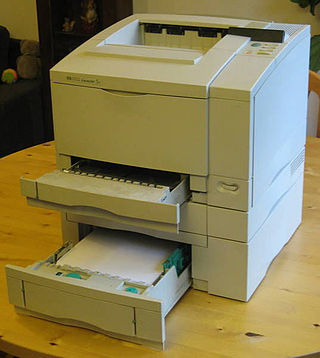
In computing, a printer is a peripheral machine which makes a durable representation of graphics or text, usually on paper. While most output is human-readable, bar code printers are an example of an expanded use for printers. Different types of printers include 3D printers, inkjet printers, laser printers, and thermal printers.
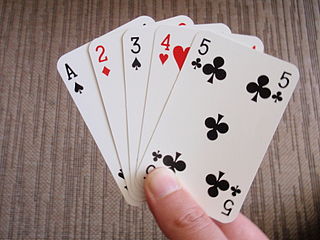
A playing card is a piece of specially prepared card stock, heavy paper, thin cardboard, plastic-coated paper, cotton-paper blend, or thin plastic that is marked with distinguishing motifs. Often the front (face) and back of each card has a finish to make handling easier. They are most commonly used for playing card games, and are also used in magic tricks, cardistry, card throwing, and card houses; cards may also be collected. Playing cards are typically palm-sized for convenient handling, and usually are sold together in a set as a deck of cards or pack of cards.
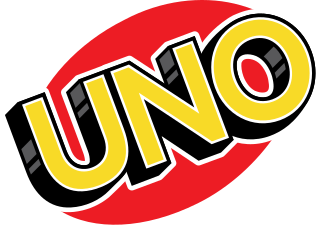
Uno, stylized as UNO, is a proprietary American shedding-type card game originally developed in 1971 by Merle Robbins in Reading, Ohio, a suburb of Cincinnati, that housed International Games Inc., a gaming company acquired by Mattel on January 23, 1992.

In the United States and Canada, bingo is a game of chance in which each player matches the numbers printed in different arrangements on cards. The game host draws balls at random, marking the selected numbers with tiles. When a player finds that the selected numbers are arranged on their card in a horizontal, vertical, or diagonal line, they call out "Bingo!" to alert all participants to a winning card, which prompts the game host to examine the card for verification of the win. Players compete against one another to be the first to have a winning arrangement for the prize or jackpot. After a winner is declared, the players clear their number cards of the tiles and the game host begins a new round of play.
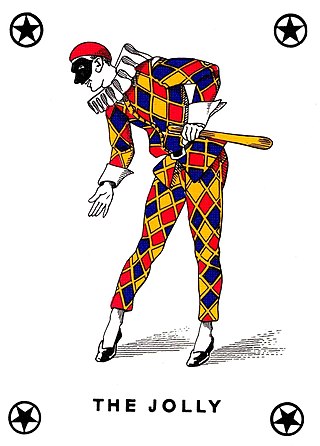
The Joker is a playing card found in most modern French-suited card decks, as an addition to the standard four suits. Since the second half of the 20th century, they have also been found in Spanish- and Italian-suited decks, excluding stripped decks.
The collectible card game Magic: The Gathering published seven expansion sets from 1993 to 1995, and one compilation set. These sets contained new cards that "expanded" on the base sets of Magic with their own mechanical theme and setting; these new cards could be played on their own, or mixed in with decks created from cards in the base sets. With Magic's runaway success, many of the printings of these early sets were too small to satisfy the rapidly growing fanbase. Cards from them became rare, hard to find, and expensive. It was not until Fallen Empires and Homelands that Wizards of the Coast was able to print enough cards to meet demand; additionally, Wizards of the Coast published Chronicles, a reprint set that helped fix many of the scarcity issues with the earliest sets.

Preferans or Russian Preference is a 10-card plain-trick game with bidding, played by three or four players with a 32-card Piquet deck. It is a sophisticated variant of the Austrian game Préférence, which in turn descends from Spanish Ombre and French Boston. It is renowned in the card game world for its many complicated rules and insistence on strategical approaches.
The collectible card game Magic: The Gathering published nine base sets from 1993–2007, also referred to as core sets. The base sets were considered descendants of the original Limited Edition, and shaped the default setting and feel of Magic. These sets consisted entirely of reprinted cards. These cards were generally simpler than cards in expansion sets, omitting multicolored cards, and used only the original abilities and keywords of Magic such as Flying and Trample. This simplicity led to many cards from these sets being considered "staples" of deck design. All cards were given a white border to mark them as reprints, with a few exceptions. From Fourth Edition in 1995 onward, a new base set would come out once per two years in the spring or early summer; for tournament play, that set would be legal for two years in the Standard format until the next core set replaced it.

A scratchcard is a card designed for competitions, often made of thin cardstock or plastic to conceal PINs, where one or more areas contain concealed information which can be revealed by scratching off an opaque covering.

Dune is a strategy board game set in Frank Herbert's Dune universe, published by Avalon Hill in 1979. The game was designed by Bill Eberle, Jack Kittredge and Peter Olotka. After many years out of print, the game was reissued by Gale Force Nine in 2019 in advance of the 2021 Dune film adaptation.

Bingo cards are playing cards designed to facilitate the game of Bingo in its various forms around the world.

Ganjifa, Ganjapa or Gânjaphâ, is a card game and type of playing cards that are most associated with Persia and India. After Ganjifa cards fell out of use in Iran before the twentieth century, India became the last country to produce them. The form prevalent in Odisha is Ganjapa.

The Connecticut Lottery Corporation, also called the CT Lottery, is the official lottery in Connecticut. It was created in 1971 by then-Gov. Thomas Meskill, who signed Public Act No. 865. The first tickets were sold on February 15, 1972. The Connecticut Lottery offers several in-house drawing games; Connecticut also participates in Mega Millions and Powerball; each are played in 44 states, the District of Columbia, and the U.S. Virgin Islands.
These are the statistics for the Euro 2008 in Austria and Switzerland.

FITS (Fill In The Spaces) is a Tetris-like board game published by Ravensburger in 2009.
These are the statistics for the Euro 2004 in Portugal.
These are the statistics for UEFA Euro 2000, held in Belgium and Netherlands.

Android: Netrunner is an Expandable Card Game (ECG) produced by Null Signal Games, previously by Fantasy Flight Games. It is a two-player game set in the dystopian future of the Android universe. Each game is played as a battle between a megacorporation and a hacker ("runner") in a duel to take control of data. It is based on Richard Garfield's Netrunner collectible card game, produced by Wizards of the Coast in 1996.
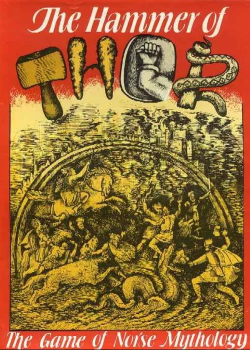
The Hammer of Thor is a board game for 2–362 players published by Nova Game Designs in 1980.

Gaigel is a card game from the Württemberg region of Germany and is traditionally played with Württemberg suited cards. It is a Swabian variant of Sechsundsechzig and may be played with 2, 3, 4 or 6 players. However, a significant difference from Sechsundsechzig and other related games like Bauernschnapsen is the use of a double card deck. The four-player game is usually called Kreuzgaigel. The game emerged in the early 19th century.














